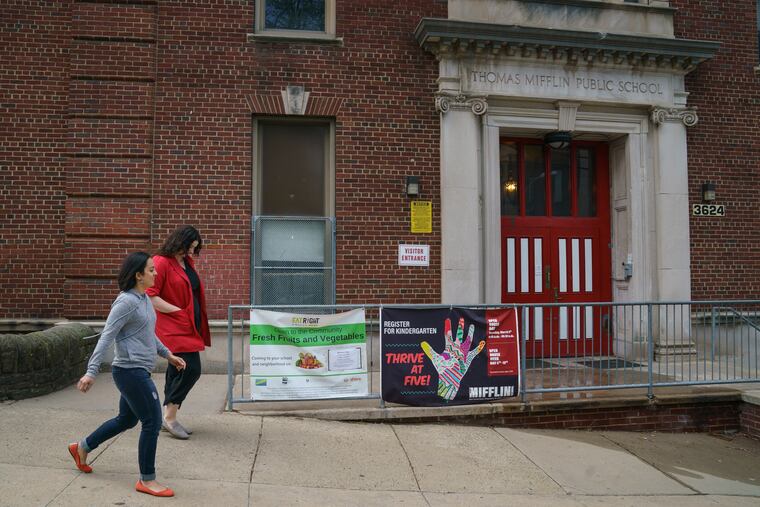In face of parents’ objections, Philly school board holds off charter school moving to East Falls
“We intend to operate one system of public schools. We cannot look at each decision in isolation,” Wilkerson said at the board’s Thursday night meeting.

The Philadelphia Board of Education voted unanimously Thursday to indefinitely postpone a decision on a proposed move by Laboratory Charter School to East Falls. The School District had recommended the relocation, which it said would benefit the charter financially.
But it was hotly contested by East Falls parents who said the school never informed the community of its plans, and questioned why another charter was being permitted to open in a neighborhood where the traditional public elementary school has available seats.
Board president Joyce Wilkerson said the move’s benefits to the charter students, staff, and families were clear. But, she said, “it is equally clear that there has not been enough planning and thought put into making sure this move will work for the community into which this school intends to locate."
“We intend to operate one system of public schools. We cannot look at each decision in isolation,” Wilkerson said at the board meeting. She proposed delaying the decision to gather additional information about the charter’s intended relocation, including its potential impact on Thomas Mifflin Elementary.
The board’s vote was unanimous. It had received a petition with more than 600 signatures and heard testimony against the charter’s relocation.
“We have to ask ourselves, what message does it send our kids when we open another charter school when we have a local neighborhood public school ... ready to serve our students?" said parent Mary Alice Duff. She said "the lack of community engagement by Lab Charter feels intentional.”
Laboratory Charter enrolls 541 K-8 students and is now spread across three campuses in Overbrook and Northern Liberties. A move to East Falls would allow it to consolidate and enroll up to 1,000 students.
If approved, the move would have given East Falls two K-8 charters. Philadelphia Hebrew, which received a final charter Thursday, is scheduled to open this fall and is approved to enroll up to 700 students.
Both charters would have been located at the same complex on Henry Avenue, where a third charter, Eastern University Academy, is also located. That charter, which serves grades 7 to 12, is fighting nonrenewal but is planning to move out of East Falls.
Laboratory Charter was voted for nonrenewal by the former School Reform Commission in 2017, due in part to financial concerns. But the commission reversed course in 2018 after the school contracted with a new business service provider.
Laboratory CEO Andrea Coleman-Hill said earlier this week that the charter would continue to operate if the relocation was not approved.
Here are four things to know about the rest of the school board’s Thursday actions
About that shutdown. In the first board session after activists shut down a meeting in frustration over a decision to mandate metal detectors at all schools, Wilkerson said that the board welcomed discussion and realized that would sometimes come in the form of dissent.
Wilkerson said the board would “not tolerate disruptions that deprive other members of the public the right to hear the board conduct its business and to have their voices heard,” and emphasized that “we expect individuals to adhere to basic principles of civility, decorum and respect while at the board meetings.”
No to Relay. In a surprise vote, the board rejected a $114,500 contract with Relay Graduate School of Education for principal training. Several board members said they had concerns about Relay, which is not accredited in Pennsylvania to award graduate degrees. (Relay has accreditation from the Middle States Commission on Higher Education.) Chief schools officer Shawn Bird said Relay’s lack of Pennsylvania credentials was not a problem, since Relay would not be offering Philadelphia principals graduate classes but providing leadership training.
Board members Julia Danzy, Leticia Egea-Hinton, Mallory Fix Lopez, Maria McColgan, and Christopher McGinley voted against the contract. Wilkerson, vice president Wayne Walker, and members Lee Huang and Angela McIver voted to approve.
Budget hearing. The board held its formal hearing on its $3.4 billion budget for 2019-20. The spending plan allows for more nurses, teachers, and teachers for English-language learners. The board took no action on the budget, which will be aired before City Council in May and come up for a vote by the school board later that month.
The budget projects a modest fund balance at the end of fiscal 2020, but the picture deteriorates in the final years of the district’s five-year plan. By 2022, the district is projecting a $30 million budget deficit.
Overcrowding in South Philly. More than a dozen South Philadelphia parents and teachers packed the board meeting to talk about overcrowding issues at Meredith Elementary, soon to spill over to Nebinger Elementary. Meredith, one of the city’s top schools, now has a wait list for kindergarten, and its overflow students are sent to nearby Nebinger, which will soon hit capacity, parents said.
There is no room at Meredith, where teacher Emily Lieber said class size makes one-on-one interactions with students are rare. “I know my 36 first graders deserve more,” Lieber said. She and others called on the district to devise a comprehensive plan to deal with overcrowding.
Correction: A previous version of this story misstated the size of the district’s projected budget deficit. It is $30 million, not $300 million.